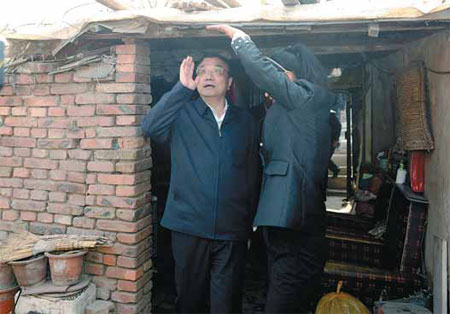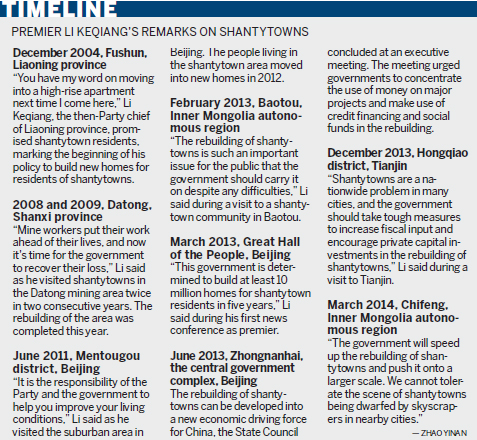 |
|
Premier Li Keqiang checks the ceiling of a resident's home in Tienan, a shantytown in Chifeng, Inner Mongolia autonomous region, on Thursday. He said the government will further renovate shantytowns and move residents to high-rise buildings as soon as possible. Liu Zhen / China News Service |
|
 |
|
|
Li stressed his determination to transform the damp and unsanitary living conditions of nearly 100 million people during his visit to Chifeng, the region's most populous city.
"We can't let our people live in shanty houses while building skyscrapers on the other side of the road," he told residents of the Tienan community. "It will be a difficult project, unless we're in it together."
The premier said in the Government Work Report to the annual session of the National People's Congress this month that China will start the construction of another 4.7 million apartments as part of an effort to rebuild shantytown areas.
The Tienan community, an area of 4.5 square kilometers in downtown Chifeng, has 4,850 households and 16,000 residents.
It was built in the early 1980s as temporary housing for railway employees, but most of the residents have not been able to afford new houses or move out of the area, said Zhao Yurong, head of the urban neighborhood committee.
Paths made of earth and coke residue led the premier's way to local households.
"It is common to see here that families with two or even three generations still live under one roof, and their only house is only about 30 square meters," Zhao said.
The premier visited the house of Zhou Jingyou, 51, who has lived in the community for 20 years.
His semi-underground house has a small yard, where Zhou has set up a kitchen, and his wife uses the remainder of the yard to raise rabbits and dry laundry. Inside, a coal stove burns in the living room, with a chimney projecting through the window.
Zhou lives in the 30-square-meter house, with his wife, daughter and grandson.
During the rainy season, water can stream into these semi-underground houses, Zhou said. Another problem is sanitation, as the family has to share a toilet with many other households in the neighborhood.
Zhou, who only has a part-time job at a local rubber plant, said they could not buy another apartment because of their limited income.
"We can only count on the government's aid to move into a new apartment. Otherwise, it would be impossible for us to afford the mortgage," he said.
Zhou said the premier told him about the government's project to rebuild the area, and that financial aid will be provided and some of the costs of a new house would be covered.
"It gives us hope. We're thrilled," he said.
Sun Xiaoqin, who was also visited by the premier, had lived in the neighborhood with her husband for more than 13 years.
Sun said she was unaware of the premier's visit on Thursday morning and was surprised when he walked into her grocery store.
"He asked about our income, whether we had to pay taxes and whether our public telephone is still being used by residents," she said.
"Living here is the only choice for most households here because they can't afford the rent or housing prices anywhere else," she said.
China has about 100 million urban residents in shantytowns, and Li has promised to build at least 10 million homes for them by 2018.
As of 2013, China has improved the living arrangements of 2.18 million households in shantytown areas and embarked on projects that could improve accommodations for another 3.23 million households.
Contact the writers at [email protected] and [email protected]

